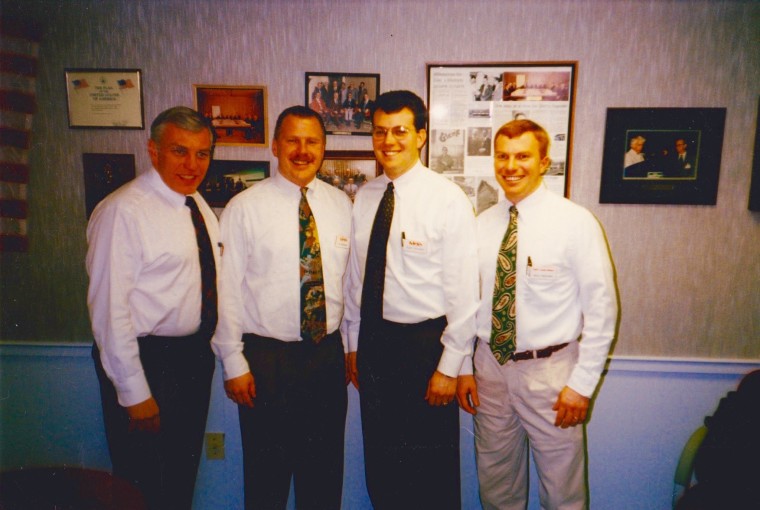
I wrote this guest post for my daughter’s blog. Enjoy.
Growing up, I always dreamed of playing sports as an adult. When reality hit me that I wasn’t good enough, I turned my attention to a teaching and coaching degree. That all changed in 1963 when I was a sophomore at Central Michigan University. My future father in-law, C. Glen Catt, offered me an opportunity to join him in his family-owned grocery business. I joined him by helping him and his team open his fourth store in East Jordan, Michigan. That was the beginning of a thirty-five year career working in our family-owned grocery business.
As our family looks back over the past sixty-four years of being in business, we are very grateful for our founders who made it all possible. We appreciate them for their hard work and dedication which gave us such a great start with having substantial company assets making it easier to continually run the company, great framework of business with the real estate and grocery business, and a passion to take care of our customers, our employees, and our family business.
Family businesses are the lifeblood of all American businesses. For 90% of all businesses in North America are family-owned businesses.* There are 5.5 million family-owned businesses in the United States.* Family-owned businesses employ 63% of the work force in the United States.* The average life span of a family owned-business is twenty-four years.**
A family-owned business can only be understood over time. The start-up struggles and the growing pains throughout our now sixty-four years give us many stories as we look back over the years. What exists today is far different than when it all started in 1951 with our first, little grocery store in Gaylord, Michigan.
Family-owned businesses are unique because they are composed of normal people with problems, conflicting needs, concerns, abilities, and rights, and also share one of the strongest bonds human beings have, a family relationship. The family-owned business is so much more than a business. It’s a mixture of opportunity and entitlement, heavily masked by more obvious ingredients of jobs, money, power, taxes, products, markets, and benefits. No wonder tension can arise.
The family-owned business has to deal with the normal perils of inflation, taxes, regulations, shortages, unemployment, competition, and many other crises that all businesses deal with. Yet, they have an unique problem that is a major issue–dealing with the family members– and sometimes that can take a lot of time and energy solving the family-related problems. For you’re not just tackling the daily business issues, but also dealing with personal family issues making the business model unique from non-family models.
Of course in a family business, we never stop learning, and hopefully, we learn from our mistakes. A successful family business involves the lives, hopes, dreams, and efforts of all generations starting with the founder.
While the dad worked hard through the early years of the family business, the mom raised the family and watched from the sidelines to see whether the business was going to survive. (In some cases, the mother worked alongside the dad or ran her own family-owned business). Throughout these years, an understanding spouse is very much needed. In our family’s case, our mother worked alongside of Dad for many years to accomplish their dreams together.
Because a family-owned business so closely reflects the character and personality of its owner-founder, it has a great deal of the business owner’s early years built into it, even though the younger family members don’t usually realize it. Unless positive teaching takes place between generations, miscommunication can easily happen.
The failure to teach or the unwillingness to learn are the two most dangerous mistakes made in a family business. Since it’s a family business, dads and moms get to teach their kids what they’re doing. If what they’re sharing is positive then there is a good possibility that some of the kids will join them in the family business.
By the time the founder is fifty or sixty years of age, he may consider slowing down, thinking: I just want to keep what I have and enjoy it. It’s about this time, the younger members of the family have their eyes on growing and expanding. Here, you can see whether the family members are on the same page.
Many times in a family-owned business, a kind of tunnel vision can occur by the leaders by not planning for the future. Sometimes elder leaders fight against change and think, if it’s not broke, why change? Of course, the younger generation is a “now” generation thinking, let me have my turn and now! In a family business, these can be big issues to overcome, and they have little to do with marketing, sales, and competition.
One of the keys to a successful family business is open communication. From the top person down to the kids, everyone sharing where the business is going is so important. Sometimes it is very helpful to bring in professionals to help address the tough questions. Questions such as succession planning, estate planning, or long-term planning can be overlooked in family-owned businesses. Open, direct communication keeps everyone informed so there are no surprises.
After all, we are a family that happens to be in business together and our hope is that our family business continues forever.
What about you? What have you learned in a family-owned business? Please share in Comments below. Thank you.
Source of information:
* Conway Center for Family Business
** Family Business Facts on the University of Virginia, School of Business Administration website
